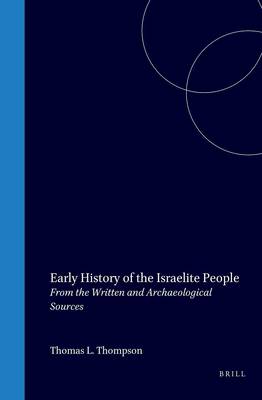
- Afhalen na 1 uur in een winkel met voorraad
- Gratis thuislevering in België vanaf € 30
- Ruim aanbod met 7 miljoen producten
- Afhalen na 1 uur in een winkel met voorraad
- Gratis thuislevering in België vanaf € 30
- Ruim aanbod met 7 miljoen producten
Zoeken
€ 564,95
+ 1129 punten
Uitvoering
Omschrijving
Through a review of historical scholarship of the past century, and an analysis of data drawn from archaeological excavations and surveys and from written and historical records from the late second and early first millennium, the author reconstructs the historical basis of Israel's origins within the contexts of geography, anthropology, and sociology.
Thompson argues that none of the traditional models for the origin of biblical Israel in terms of conquest, peaceful settlement, or revolution are viable. The indigenous nature of the Israelite people has roots that lead back to the late Neolithic period. The Iron I period is not the period in which the origins of Israel are to be sought. Rather the geographical and regional expansion of settlements in this period reflects an economic response to drought conditions that affected the entire East Mediterranean basin. The ninth and eighth century states of Samaria and Jerusalem had separate and independent origins rooted in the development of a Mediterranean economy and an expansion of trade brought about by Assyrian interests. The development of the ethnic concept of biblical Israel with its roots in the United Monarchy finds its context in history first at the time of the Persian renaissance guided by the theological concepts of 'exile' and 'restoration.' Finally, Thompson argues that biblical Israel is historically the creation of the tradition itself in the Persian period and attempts to outline both a historical context and an interpretative matrix for the Bible.
Thompson argues that none of the traditional models for the origin of biblical Israel in terms of conquest, peaceful settlement, or revolution are viable. The indigenous nature of the Israelite people has roots that lead back to the late Neolithic period. The Iron I period is not the period in which the origins of Israel are to be sought. Rather the geographical and regional expansion of settlements in this period reflects an economic response to drought conditions that affected the entire East Mediterranean basin. The ninth and eighth century states of Samaria and Jerusalem had separate and independent origins rooted in the development of a Mediterranean economy and an expansion of trade brought about by Assyrian interests. The development of the ethnic concept of biblical Israel with its roots in the United Monarchy finds its context in history first at the time of the Persian renaissance guided by the theological concepts of 'exile' and 'restoration.' Finally, Thompson argues that biblical Israel is historically the creation of the tradition itself in the Persian period and attempts to outline both a historical context and an interpretative matrix for the Bible.
Specificaties
Betrokkenen
- Auteur(s):
- Uitgeverij:
Inhoud
- Aantal bladzijden:
- 482
- Taal:
- Engels
- Reeks:
- Reeksnummer:
- nr. 4
Eigenschappen
- Productcode (EAN):
- 9789004094833
- Verschijningsdatum:
- 1/01/1994
- Uitvoering:
- Hardcover
- Formaat:
- Genaaid
- Afmetingen:
- 170 mm x 247 mm
- Gewicht:
- 997 g

Alleen bij Standaard Boekhandel
+ 1129 punten op je klantenkaart van Standaard Boekhandel
Beoordelingen
We publiceren alleen reviews die voldoen aan de voorwaarden voor reviews. Bekijk onze voorwaarden voor reviews.








